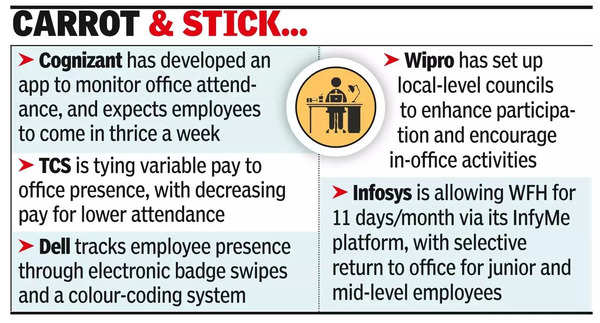Tech companies are employing different strategies to encourage their workforce to return to the office. The unprecedented flexibility that employees enjoyed during the pandemic is now being scaled back as companies reassert their expectations and exert control over the work environment.Employees find themselves in a challenging position, with no option but to comply with these directives or potentially face repercussions for non-compliance.
Earlier this year, Cognizant’s CEO, Ravi Kumar, announced the development of a new app that will enable managers to create a roster based on requirements, in addition to the existing FlexiSeat app for booking seats across its facilities. This application will allow the company to monitor work-from-office compliance. In a memo, Kumar had stated, “Our collective goal is to ensure that we are in the office with a purpose.” He also mentioned that employees are expected to come to office three times a week or as defined by their leader. In fact, Cognizant has embarked on the NextGen programme aimed at simplifying its operating model and consolidating and realigning office space to reflect the post-pandemic hybrid work environment. An email sent to Cognizant on the new app rollout didn’t elicit a response till the time of going to press.
TCS has implemented a policy that links the amount of variable pay employees receive each quarter to their presence in office. Employees who work from office less than 60% of the time will not receive any variable pay, while those with an office attendance between 60-75% will receive 50% of the variable pay. Employees who come to office 75-85% of the time will be eligible for 75% of the variable pay, and only those with an office compliance level above 85% will receive full variable pay for the quarter.
Dell Technologies plans to use electronic badge swipes, VPN, and a colour-coding system to track employee presence. The four colours used are blue (consistent on-site presence), green (regular on-site presence), yellow (some on-site presence), and red (limited on-site presence). Tech chronicler The Register was the first to report the development. Dell has a significant presence in India but does not disclose the exact number of employees in the country.
In contrast, Wipro has taken a milder approach. In a recent letter to employees, its chief human resources officer Saurabh Govil stated that local-level councils have been set up to “enhance associate participation, engagement, collaboration, and networking”. Govil informed employees that there would be more in-office activities to encourage people to work from Wipro campuses across India.
Infosys’s employee experience platform, InfyMe, allows employees from select business units to apply for work-from-home for 11 days in a month. Last year, Infosys had asked select employees at the junior and mid-levels to return to office ten days a month starting Nov 20, deviating from some of its peers who are enforcing a five-day work week.
